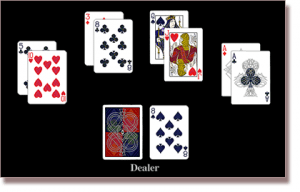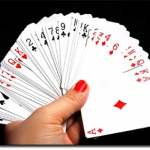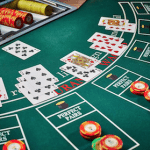Blackjack is a game that favours smart decision making and following strategies over impulse moves. Unlike roulette, which is a game of total chance, blackjack’s outcomes depend largely on tactics and rational thinking, crucial elements required to get the most out of this game. So if you’re new or inexperienced, remember to have fun first and foremost, but also choose your moves wisely. 21 is an ideal game for those who want more control over results and potential returns.
This article will discuss general blackjack strategy guidelines which you should adhere to while playing 21. For an in-depth understanding of the best strategy regarding when to hit, stand, double, split and surrender for every possible player hand combination against the dealer’s up-card, we cover all the rules and optimal blackjack game-play here.
There are a variety of different approaches to tackle when playing 21, but the sheer number of blackjack strategies available can be overwhelming to research. Here are the most straight-forward approaches and helpful blackjack tips to consider for not just inexperienced players, but players of all skill levels.
Basic blackjack strategy

The following is the most basic of all strategies which should get you by if you are relatively new to blackjack. These simple guidelines are obviously flexible, but so are most of our decisions when gambling. These are the simplest rules proven to work best for players in the long run. We do suggest learning basic strategy on top of this, which further explains the most proven ways to come out on top.
Player hands totalling 12 through to 16 (without an Ace, or with an Ace where it must be valued at one point) are considered hard/stiff hands, where you can bust if you hit. If the dealer’s up-card is a Deuce through to a Six, that is also considered a hard/stiff hand (only for the dealer). If you have a total of 17 or more, this is called a pat hand, and you should stand (hence the term ‘standing pat’). If the dealer’s up-card shows a Seven through to an Ace, you also consider it a pat hand (only for the dealer).
- If you have a hard/stiff hand and the dealer has a hard/stiff hand, you should stand.
- If you have a hard/stiff hand and the dealer has a pat hand, you should hit.
If you play blackjack without a strategy and purely on instinct, it can be very dangerous. But if you go in with at least a simple blackjack strategy, play appropriately, and endeavour to learn more, the house edge is low and you significantly increase your chances for netting stronger returns.
Learn more about the difference between hard and soft blackjack hands.
Consider these blackjack strategy tips
Not all blackjack strategy tips should be used at every possible opportunity. Blackjack is a game built on odds and understanding what you and the dealer have comparatively is very important.
While the below blackjack tips are based on factual, mathematical evidence, use them at your discretion and always bankroll, to ensure you don’t blow the budget.
The following provides some more important all-purpose blackjack strategy tips for player of all standards.
ASA: Always Split Aces
Most experienced blackjack players will tell you splitting Aces is a no-brainer in order to maximise your chances of hitting blackjack. The Ace is valued at either one or 11 points, and so if we are dealt two, rather than keep them together for a total of either two or 12, split them with an additional bet equal to your original wager, and now you have two separate hands. You will be dealt one card to each hand and have a strong chance of drawing at least one card valued at 10 for an instant blackjack. If you do not draw 21, the vast majority of casinos will allow you to play out the hand just as you would normally.
Note that due to the popularity of splitting Aces in blackjack, some casinos do not regard an Ace and a 10-valued card (following a split) as a natural blackjack, and may not pay out at the regular 3:2 odds we usually receive for hitting 21 off two cards, but rather at 1:1 odds. But regardless of the rule variations, asa to give yourself the best possible chance of winning your hand.
Learn more about the value of Aces in blackjack.
Doubling on 9, 10 & 11
Doubling in blackjack, placing an equal wager to that of your initial bet in exchange for committing to stand after receiving only one additional card, acts as a ‘twice the risk, twice the reward’ style play option.
If you find yourself with a hand which totals nine, 10 or 11, you are in a strong position where you should at least consider doubling down. A likely face card (or Ten) will give you a total of either 19, 20 or 21, while an Ace (except on the hand worth 11 points), Eight or Nine will also leave you in a solid winning position. Doubling is an essential weapon with the potential to maximise a winning payout, but you have to be educated and know when to commit to and when to refrain from doing so. For an in-depth guideline of when to double, view our doubling down page.
Avoid Insurance
There aren’t many gamblers who will recommend taking the insurance side bet in blackjack. We will briefly explain what insurance is in order to make it easier to understand why it should be avoided. Insurance is only open to players when dealers display an Ace as their up-card, and before checking or drawing a second card. If this situation arises, we can choose to ‘protect’ our hand against the dealer hitting blackjack. The bet has nothing to do with the cards we hold, it is simply a wager on whether the dealer will draw a card valued at 10 to make blackjack. To place the side bet, we must put up (at the most) half of our original bet; so $5 if we’ve bet $10 on our own hand at the start.
If the dealer does hit 21, insurance pays out at 2:1 odds, so we’d win $10 (get back a total of $15), but lose our original wager of $10, thus breaking even. If the dealer doesn’t hit blackjack, we lose our insurance bet and play out our hand. If we win our hand, we do come out ahead, but not by as much if we hadn’t insured. If we lose our hand, then it’s a double blow. In the long-run, the bet is not profitable because the dealer is likely to have blackjack less than one-third of the time. If you’re hazy on the exact details, best to avoid it anyway.
Refrain From Going All In
All players have their own idea and intuition of when their luck is shining, but blackjack always favours tactical decisions over impulsive actions. The importance of maintaining control of your bankroll and refraining from dangerous impulses is important for beginners and experienced players.
Perhaps most critically, always make sure you have enough money left for the possibility of splitting your hand (especially if you are dealt two Aces) and doubling down. If you are caught off-guard and do not have enough money to split or double, you are effectively wasting a great opportunity to earn additional profits.
Don’t Be Afraid to Surrender
Some versions of real money blackjack offer the option to surrender and retrieve half of our bet. While it’s not exactly ideal or resourceful, don’t necessarily completely disregard the option (if available) without thought. If we hold a hard hand with a total of 16 for instance, and the dealer has an Ace, surrendering might be worthy of our consideration. Knowing if and when to surrender is important and shouldn’t be over-looked, but obviously consistent surrendering is not a viable option, because that’s just throwing money down the toilet. For more information about when to consider forfeiting your hand, read our in depth surrendering article.
Play American Variants of 21
There are so many different types of blackjack available, but American versions are best in terms of player-friendly rules, house edge and flexibility. Doubling down, surrendering, splitting and re-splitting are all allowed with less restrictions than the European version, and the American style has a 0.08% lower house edge than it’s European counterpart. In the American version, the dealer must stand on soft-17, we can double on any hand total, re-split already split hands, and opt to surrender at any time during play.
Be Polite… When at a B&M Casino
While keeping our cool after a long losing streak is easier said than done, it’s important to show common courtesy when playing with others. Don’t take out your frustrations on a dealer or other players, or annoy fellow players, and try to have fun (as innocent as that sounds), because in the end, that’s why we gamble. We don’t want to run the risk of being ejected from the casino. Having said that, playing online at home gives us some extra space to allow for our moments of rage and indignation! Just don’t take it out on your screen because then you really won’t be able to gamble. Ultimately, if we are no longer enjoying blackjack due to a bad loss or losing streak, we should seek to move on and cut our losses.
For more information, read our blackjack guides:
- Bad blackjack strategies
- When to hit and when to stay in blackjack
- Managing your money at the blackjack tables
- What to do when the dealer shows a six
- What to do when dealer up-card is a seven
- When to stay away from the blackjack tables
- When not to play blackjack
- Wrong way to play 21
- Blackjack superstitions
- Five times going all in paid off



